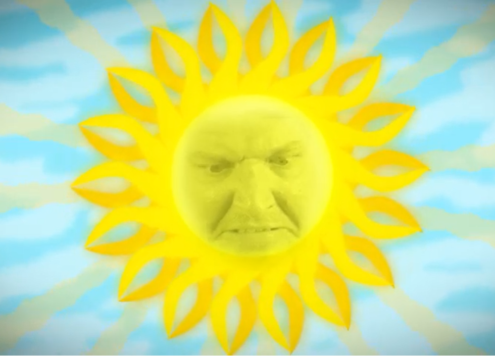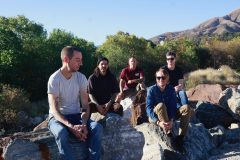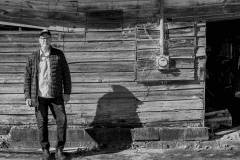In what world do we begin to kid one another that Sun Ra Arkestra isn’t one of the greatest bands of our generation, our parents’ generation, and possibly that of our grandparents? Formed by Le Sony’r Ra, the 1950s saw the first releases as Sun Ra And His Arkestra, and after his death in 1993, continued as the Sun Ra Arkestra with Marshall Allen leading the group. These forefathers of Afrofuturism have unleashed its new Living Sky (Omni Sound), an album rife with beauty and incredible melodies. the 7-track album itself is a living, breathing organism, capable of changing one’s perception of music itself. The percussion throughout is understated but visibly a large part of the Arkestra’s sound. Horns and wind instruments align the walls of these songs but it’s on “Day Of The Living Sky,” where string instruments are plucked, we feel the breeze of open fields cluttered with foliage and greenery. within Living Sky, you’ll find an array of imagery, and it’s unlike anything you’ve ever heard. Or seen.
Chicago’s Ganser returns with its new EP, Nothing You Do Matters (Felte Records), the band’s first new music since 2020’s Just Look At The Sun album. Last year saw the release of a couple of remix EPs but this is what fans have been waiting for. The songs included here seem to find the post-punk outfit much more relaxed than it has been in the past. The music seeps through speakers naturally, like osmosis. There’s an ominous aspect to the songs; they’re throwing a party and they’re inviting everyone so of course, you’ll want to be a part of it all. The band opens with “People Watching,” slithering in with python-crushing force. It’s subdued but powerful. Guitars ring out as the rhythm section is completely controlling. Spoken-sung vocals are finite and distinct, never questioning and always commanding. Yes, the band returns to its unrelenting form and the canvas it paints “What Me Worry?” with, expounds on everything the band does well. Opening with electronic tones, Ganser builds around the song with its instruments, never forcing the construction, allowing the melody to ride the delicate and abrupt soundwaves. This time around, the band seems to layer everything with stunning effect. Also included here is a dance remix of “People Watching” by Liars. Her vocals echo across a sonic space that comes across like an early Meat Beat Manifesto. While it isn’t a Liars best maneuver, it’s ok. The two original songs whet the appetite for what’s to come.
CAUSTIC CASANOVA – GLASS ENCLOSED NERVE CENTER
Never certain how things come to fruition or how life is impeded, there are moments when you have to wonder why something or someone hasn’t received the accolades it’s deserving of… or maybe even allow scribes to tear their work(s) to shreds (honestly, the latter can sometimes be fulfilling so long as it’s constructive, for both parties.) But while the band’s 2015 Breaks album was the last time I heard anything from the band, Caustic Casanova had released 2019’s God How I Envy The Deaf. We’re here now though, and that’s the important thing. The band just released its new album, Glass Enclosed Nerve Center (Magnetic Eye Records), and maybe with this release, life should get a little easier. Or more difficult. Depends on your perception.
My point; where was I going with this? Oh yeah, Caustic Casanova, which was a trio last I knew of the band, has expanded to a quartet. The band, made up of bassist/vocalist Francis Beringer, drummer/vocalist Stefanie Zaekner, and guitarist Andrew Yonki, now includes second guitarist Jake Kimberley who joined the band back in 2019. On Glass Enclosed Nerve Center, it’s thickened the band’s sound and I’m not mad at that. But where does the band actually “fit”? That’s the interesting thing about the group; the sound that emanates from their instruments as a collective unit extrapolates in a variety of directions. While the band has a technical prowess that allows it to find firm footing within prog rock, it extends into hard rock, pop, punk, and metal. It’s usually all intertwined within the same song, with one style taking precedence over others. The group opens with “Anubis Rex,” which has nothing to do with Anubis, the Egyptian god of old but the two-part leveled Pac Man World I’ve never played. The band quickly grabs hold of your attention, never releasing it with walls of guitars and great hand movements all over its drums. Surprising with a cowbell (We need more cowbell) this track is a pop/hard rock masterpiece with clever harmonies throughout. This is just the first track on the release, but things never go awry.
Opening with guitar experimentation, the bottom-heavy “Lodestar” is full-frontal, in-you-face, nonstop action. The band revels in the sonic explosiveness and both vocalists play off one another, at times harmonizing with one another but then with a brooding vocal delivery. If you want to know what tightness is, then it’s this because it’s unrelenting and tighter than a muskrat’s ass. The same could be said about “A Bailar Con Cuarentena,” loosely translated into “dancing in quarantine” but the band could mean something completely different, as the song gets ahold of an oddly funky groove, which expands into something brilliant. The group storms through, stops on a dime, continues, and gets lost in the revelry as we all should. Caustic Casanova is quite the conundrum though, unloading lengthy numbers like the 9+ minutes of “Shrouded Coconut,” which moves with obvious prog-like precision but is also spacious. What you may think is an instrumental as the song bounces & careens for almost 4 minutes before vocals chime in as Stefanie & Francis harmonize exquisitely. The band changes its movement and the song itself becomes something malevolent. Sure they could have probably broken up this piece into a couple of different songs but as I’m sure they probably thought, “Hey, let’s see where this goes.” And they killed it.
The odd man out here is “Bull Moose Against The Sky,” and clocking in at over 22 minutes, the band actually does allow the song to take on a life of its own. Make no mistake, this isn’t a free jazz effort allowing instruments to cross streams in an effort to see what sticks, no, this is controlled, this is organized, there is no confusion. Although, this is the moment where prog, pop, rock, and punk are allowed to find lives all their own. There are a number of movements throughout, and that’s to be expected with the band. They don’t stick to one basic melody or rhythm. It’s much too expansive for that. With this, we know Caustic Casanova is onto something BIG, much bigger than anyone can possibly express.
With Glass Enclosed Nerve Center, Caustic Casanova ravages everything in its path from start to finish. The world needs to get to know the music created by the group, not just because it’s a great release but because the band lives in a world so expansive, musically, it’s stunning.
Facebook | Twitter | Instagram
REVERSE WINCHESTER – ROUTE 2 ULYSSES
While some artists are limited, there are those that are consistent in surprising listeners with a myriad of variations, keeping us all guessing as to what’s next. That’s not to say those artists who are comfortable within their own lane don’t have anything to offer; we just know what to expect. But this is about Reverse Winchester, a project culled from the minds of Mathieu Sourisseau and ex-pat Mike Ladd (Majesticons, ILLTET, solo, etc). The new release, Route 2 Ulysses (Freddy Morezon) takes an approach we’re familiar with but is also much different for Ladd.
While Ladd has made his mark within Hip-Hop, on Route 2 Ulysses, a different approach is taken. Keep in mind, half of Reverse Winchester is Sourisseau and his sole guitar, which allows for the perfect backdrop. I’m not certain if for the most part, this can be classified as folk, anti-folk, or any other genre creeping in around, but one thing is certain: Reverse Winchester isn’t predictable and fails to stick to any particular sound. Considering, throughout the album, we have Ladd’s voice and Sourisseau’s guitar, and the complexities through Ladd’s words ride the lightning that is Sourisseau’s guitar notes and chords. There’s difficulty in attempting to put things into words with an uncertainty of where to actually begin, but where better to start than at the very beginning right? The starkness of the opening “For C” has an underlying blues quality, but doesn’t fully commit to it, which is fine. With his gruff delivery, Ladd is descriptive in his lyricism as Sourisseau plays the melody around it. The two actually find common ground to deliver something fully intriguing and imaginative within the ravaged minimalism.
There’s a healthy dose of flair for the dramatic on “Dusty Ridge Therapy,” toying with experimentalism with fiery guitar and lyrical prose that shifts in dynamic in an almost Waits-ian fervor. It’s difficult not to make cheap comparisons when the price is heavy because just in a few tracks, Reverse Winchester lets everyone know we’re all going to pay for it. As mentioned previously, this is a different route altogether and diving in deeper is a welcomed task at hand. The frantic “Blade Runner” is quick-tongued with nimble fingers and will make you wonder if the future is in the now. Musically, it’s a composition that’s clever AF. Of course it would have benefitted from the addition of a rhythm section, but this way it’s much more poignant the way it’s conveyed. There’s also subtlety in the band’s flair for the dramatic as “The Livid Sea” can attest to. The rhythm, the melody of the lone guitar, is entrancing. It’s clear, Sourisseau is a giant among men, allowing his instrument to breathe life all around the track itself. Ladd’s lyricism here, his view, his interpretation of heaven, is one anyone would love to live within. His memorable words, “The infinite ocean full of us furious/full of us mourning/full of us rejoicing/everybody’s in tune” stay with me for some reason. Possibly because one can only wish life was truly like this.
I come back to “Don’t Tell Massachusetts,” which offers a much more worldy view of race, as questions and assumptions are made throughout. Ladd sees a varied interpretation of assumptions of cultural background. By the time we reach the end, the group reprises the opening track for “Ferocious Black Love / For C,” reinterpreting the song to include percussion & horns within. It literally takes a different form, without losing its familiarity as percussion crashes, and celestial horns reign down heaven on earth itself. This is literally on some next-level shit itself.
With Reverse Winchester, Mike Ladd and Mathieu Sourisseau deliver a stark but compelling release on Route 2 Ulysses. I’m inclined to place this release amongst the Cohens, the Waits, and the Caves that came before them. Is this album good? No, it’s not. It’s a great release.









Social Media